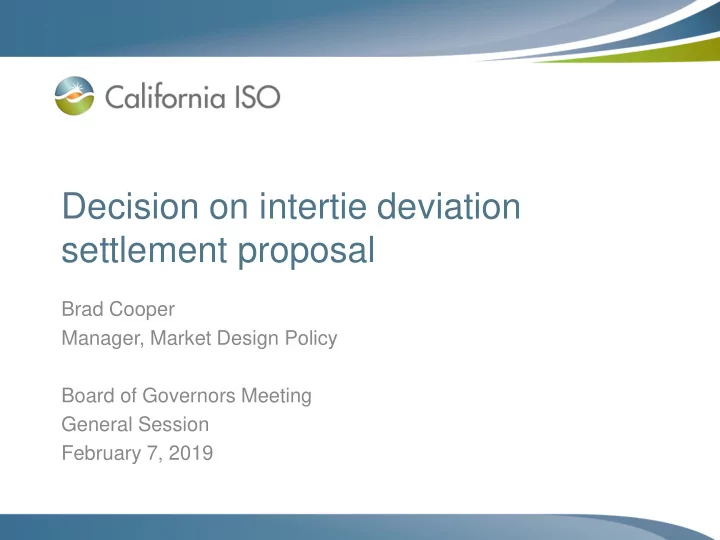

Decision on intertie deviation settlement proposal Brad Cooper Manager, Market Design Policy Board of Governors Meeting General Session February 7, 2019
Management proposes to revise the intertie non- delivery charge to provide increased assurance that market participants deliver imports and exports. • Charge applies to ISO intertie transactions with other balancing authority areas – Does not apply to transfers resulting from EIM dispatches • Non-delivery affects reliability and pricing • Existing charge is ineffective • Revised charge provides increased incentive to deliver intertie energy – Will yield more accurate market inputs and increase reliability
Undelivered intertie transactions adversely impact ISO grid stability and market pricing. • Non-deliveries affect reliability because the market is counting on supply that does not materialize – The market cannot clear additional intertie energy until the next hour – The 5-minute real-time dispatch must use available supply to compensate for the delivered intertie energy • Non-deliveries are detrimental to the market – Undelivered intertie transactions displace other intertie bids from the hour-ahead scheduling process that could have been delivered – Result in higher prices for all market participants because the 5- minute market must replace the undelivered energy – Undelivered exports can cause intertie congestion Slide 3
ISO system operators take manual actions in anticipation of undelivered imports, which may impact prices. • Manual actions include: – Increasing load forecast in hour-ahead scheduling process to schedule additional imports – Exceptionally dispatch additional imports out of the market • Operators make these adjustments to assure reliability in anticipation of undelivered imports • However, the adjustments may introduce price inconsistencies between hour-ahead scheduling process, 15-minute market, and 5-minute market that may diminish incentive to deliver imports Page 4
The existing non-delivery charge is ineffective because of a monthly 10% threshold, which is rarely exceeded. Page 5
Range of undelivered intertie supply can reach significant amounts, with average non-delivery increasing during peak load hours. Page 6
Proposed non-delivery charge strengthens incentives to deliver intertie transactions. 1. Curtailed schedules will be excluded from the non-delivery charge, which allows for removal of the 10% threshold 2. The non-delivery charge will be evaluated in each fifteen-minute interval 3. 15-minute market schedules will be based on preliminary E-Tag with “transmission profile” submitted before 15-minute market runs 4. Non-delivery will be subject to a charge equal to 50 percent of the maximum of the 15-min market or the 5-min real-time dispatch LMP, with a $10/MWh minimum, plus any imbalance energy charges
Most stakeholders support the proposal, stating it will: • Reduce “speculative bidding” behavior • Increase operational awareness and enhance reliability • Improve the accuracy of EIM resource sufficiency test Page 8
Some stakeholders question the need for separate non-delivery charge in addition to imbalance energy settlement. • Intertie energy is “surplus energy” and is not needed for reliability because the ISO has resource adequacy requirements – Response: intertie resources that economically clear the ISO market are needed for reliability as they can displace resource adequacy capacity from being available in real-time (e.g., RA imports and uncommitted internal RA resources). • Intertie resources should be treated like internal generation that just pays the 5-minute price for deviations – Response: intertie schedules require the use of transmission capacity that is reserved on an hourly basis Slide 9
Market Surveillance Committee supports charge framework, but believes the ISO must also address market inputs that affect real-time market intertie prices. • High hour-ahead scheduling process prices and lower 15-min and 5-min prices may provide incentive to not deliver • MSC urges further analysis of role of operator load forecast adjustments and intertie exceptional dispatches in intertie pricing • Management commits to analyzing and addressing intertie pricing in conjunction with implementing non- delivery charge – Management believes non-delivery charge should be implemented hand-in-hand with process improvements Slide 10
Management recommends the Board approve this intertie deviation settlement proposal. • Non-delivery charge provides greater assurance that intertie schedules will be delivered – Reduces the need for operator load forecast adjustments and intertie exceptional dispatches – Improves accuracy of market pricing • New fifteen-minute market logic and non-delivery charge improve accuracy of EIM resource sufficiency evaluation inputs – Intertie schedules will only count towards passing the flexible ramping test if preliminary E-Tag with “transmission profile” is submitted – Scheduled imports will be more likely to be delivered Slide 11
Recommend
More recommend